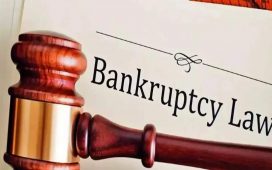CBI: UK needs to match US and EU green spending
Good morning, and welcome to our live coverage of business, economics and financial markets.
The head of the Confederation of British Industry (CBI) will today say the UK is falling behind the US and EU in developing the green economy, according to a biting assessment of the government’s failure to invest.
Tony Danker, the CBI’s director-general, will call for the government to aim for faster growth, with low-carbon technologies a key focus, in a speech today (Monday) at University College London.

The US and Europe are “outspending and outsmarting us” on green growth, Danker said. The White House under President Joe Biden has passed the Inflation Reduction Act, which will direct $369bn (£298bn) toward investing in renewable energy and reducing America’s planet-heating emissions, while the EU is considering ramping up its already considerable spending in response.
Danker (who formerly worked for the publisher of the Guardian) said:
We’re behind the Germans on heat-pumps, insulation and building retrofits, the French on EV charging infrastructure, and the US on operational carbon capture and storage projects – despite the UK’s North Sea advantage. We’re lagging all three on hydrogen funding.
While our competitors across Europe, Asia and the US are making their move, and going hell for leather, we seem to be second guessing ourselves and hoping for the best. It’s time for us to take those hard decisions, generating the forward momentum not only to limit recession this year but also get us really growing next.
You can read more here:
On a related (if shorter-term) note: the UK’s National Grid will today start paying some customers to use less energy, the first time it has used the new demand flexibility service.
The service has been trialled but not run in a live situation before. It will run from 5pm to 6pm on Monday, its Electricity Supply Operator arm said.
Our forecasts show electricity supply margins are expected to be tighter than normal on Monday evening. We have instructed coal-fired power units to be available to increase electricity supplies should it be needed tomorrow evening.
— National Grid ESO (@NationalGridESO) January 22, 2023
We are also activating a Live #DemandFlexibilityService event between 5-6pm tomorrow. This does not mean electricity supplies are at risk and people should not be worried.
— National Grid ESO (@NationalGridESO) January 22, 2023
The cold weather also means that National Grid has asked coal-fired power stations to heat up to be ready to meet peak demand (around the early evening as people start heating their homes and food). National Grid said: “These are precautionary measures to maintain the buffer of spare capacity we need.”
Full story:
The agenda
9:30am GMT: UK foreign direct investment involving UK companies (2021)
9:30am GMT: UK national balance sheet estimates (2022)
Key events
Filters BETA
That seven-month high for sterling this morning is looking like a brief encounter.
The pound is now trading at $1.2359, down 0.3% for the day. That’s down almost a cent on the morning high of $1.2447.
UK government offers £600m to British Steel and Tata for green upgrades

The UK government has offered £600m in support for Britain’s four remaining steel blast furnaces to invest in lower-emissions technology.
Chancellor Jeremy Hunt is expected to announce the support of £300m each for British Steel and Tata Steel as soon as this week, although the timing will depend on the companies accepting the offers. The BBC first reported the government offer of support to both companies.
The steel industry is one of the most difficult to decarbonise because of the huge energy requirements and the use of coking coal in iron smelting, a process which emits carbon dioxide directly.
British Steel, owned by China’s Jingye, and Indian-owned Tata Steel are both looking at how to upgrade their plants to electric arc furnaces, which heat recycled metal using electricity that can in theory come from zero-emissions source.
The British Steel and Tata plants employ thousands of workers with two furnaces each at Scunthorpe in Lincolnshire, and Port Talbot in South Wales respectively.
British Steel has been in talks with the government over support since the autumn to help it with the increased costs of carbon credits as well as much higher energy prices following Russia’s full-on invasion of Ukraine 11 months ago. Tata, meanwhile, has been in talks over the longer-term future of the Port Talbot site for several years.
It is understood any government support would be conditional on the companies also committing to investing in the plants themselves, and will be tied to environmental investments in order to comply with state aid rules.
Tata Group’s chairman, Natarajan Chandrasekaran, last summer said Port Talbot would require £3bn – including £1.5bn from the government, to keep the site operational.
Industry sources question whether that much would be required to upgrade two blast furnaces, although £300m would probably only cover the costs of upgrading one. British Steel is also thought to be looking at the possibility of carbon capture and storage for one of the blast furnaces as Scunthorpe, a method of emissions reduction that would retain the UK’s ability to continue primary steel production rather than relying on recycled scrap.
The steel industry has been crying out for support to decarbonise for several years. Labour has committed to spending £3bn to upgrade the UK’s steel industry.
Charlotte Brumpton-Childs, national officer for GMB, one of the unions representing steelworkers, said:
Any investment in the UK’s beleaguered steel industry is welcome.
But ultimately this is a sticking plaster – it does nothing to address the wider issues in the industry; catastrophic energy costs and a grossly uneven international trading environment.

Mark Sweney

The pub group Fuller, Smith & Turner has issued a profit warning, blaming months of train strikes for a £4m slump in sales including a plunge in festive season trade.
Fuller’s, which has more than 400 pubs mainly in London and south-east England, said that since the start of October industrial action on the rail network had cost the business £4m in sales.
As a consequence, the group said that profits will now come in below market expectations when it reports results for the year to April in the summer.
Sales for the crucial four-week Christmas and new year period were up 38% on the previous year, when the hospitality industry was crippled by restrictions relating to spread of the Omicron variant. However, Fuller’s said the run of strikes by various rail unions in December and January meant sales were down 5% on pre-Covid trading for the same period in 2019.
Sterling hits seven-month high against US dollar
Sterling has notched a gain today against the US dollar: it is up by 0.16% to about $1.2413.
But, more notably, earlier in the session the rate briefly touched $1.2447, its highest level in seven months.
You can see from this chart just how far the exchange rate has come back since the dark days (for the UK government at least) of nearing pound-dollar parity.

That vertiginous drop in the pound’s value in September will forever be labelled “Truss and Kwarteng”, after the UK’s shortest-serving prime minister and her chancellor, who only avoided the ignominy of being shortest in that job because another died in office.
Since they were chucked out, UK financial markets have at least calmed, and there are some signs from economic data that have suggested the economic position is not quite as bad as first feared, while other indicators have suggested the Bank of England may not need to raise interest rates quite so quickly.

The world’s best-performing hedge fund earned $16bn – you read that correctly – in profits for investors last year, the biggest dollar gain in history.
Ken Griffin’s Citadel, which was paid $16bn, moved into the top spot ahead of Bridgewater, which earned $6.2bn, according to data from investment firm LCH Investments.
Hedge funds are generally defined by their ability to make long or short investments and use complex products like derivatives and borrowed money to maximise their profits. When they manage billions of dollars, like Citadel, they can make billions themselves.
From Reuters:
Citadel, which was founded by Griffin in 1990, saw its flagship Wellington portfolio gain 38% last year while its fixed income fund was up 33%, according to a person familiar with the numbers.
That performance made for enormous returns: it charged investors roughly $12bn in expenses and performance fees, the Financial Times reported.
But the gain for the 20 top hedge fund managers was $22.4bn in 2022, which was actually the smallest gain since 2016, according to the LCH data. That was because of some almighty losses for equity funds who had relied on big technology stocks for their returns.
The Financial Times reported that Tiger Global was a big loser – in fact, it was the biggest loser in hedge fund history, according to the LCH data:
It was one of the highest-profile casualties when markets reversed, making $18bn of losses across its funds last year […] According to LCH, this ranks as the biggest annual loss in hedge fund history. LCH’s research does not include Tiger’s private equity business. Tiger Global declined to comment.
London black cab maker to receive investment from Chinese owner

The maker of London’s black cabs, the London Electric Vehicle Company (LEVC), is due to receive significant new investment from its Chinese owner, Geely.
LEVC executives told Reuters in an interview that the company would become a high-volume, all-electric brand with a range of commercial and passenger vehicles. It currently makes a hybrid vehicle with 64 miles of battery range and a petrol “range extender” – a small internal combustion engine that recharges the battery.
Alex Nan, LEVC’s chief executive, said:
We need a developed product portfolio. We need to make big investments in terms of the technology and infrastructure. Geely will make consistent investments into LEVC because this is a very unique project.
LEVC has struggled in recent years. In October it cut 140 jobs, blaming the pandemic, disruption to supply chains and “significant global economic challenges”.
“Geely fully supports the new transition strategy laid out by LEVC’s board and executive team,” Geely said in a statement.
LEVC currently has the capacity to build 3,000 taxis a year running on a single shift at its Coventry factory. Another LEVC executive said that could easily be increased to 20,000 and the plant had room to expand, Reuters reported.
Here are the other snaps from across Europe’s stock markets, via Reuters:
-
EUROPE’S STOXX 600 UP 0.2%
-
EURO ZONE BLUE CHIPS UP 0.4%
-
FRANCE’S CAC 40 UP 0.3%
-
SPAIN’S IBEXUP 0.1%
-
GERMANY’S DAX UP 0.3%
The UK’s FTSE 100 benchmark index is off to a positive start this week. It’s up 0.2% at 7,786 points.
Remember, the FTSE 100 is not too far off its all-time high. That is mainly thanks to its contingent of banks and oil companies, who have benefited in the past 12 months while growth stocks like technology companies have faltered. Central bank tightening is behind that: higher interest rates make the present value of future income lower.
The numbers to watch out for: the FTSE’s record intraday high of 7,903 points was set in May 2018, before closing at 7844.07. We’ll be on watch if it approaches that record this week.
CBI: UK needs to match US and EU green spending
Good morning, and welcome to our live coverage of business, economics and financial markets.
The head of the Confederation of British Industry (CBI) will today say the UK is falling behind the US and EU in developing the green economy, according to a biting assessment of the government’s failure to invest.
Tony Danker, the CBI’s director-general, will call for the government to aim for faster growth, with low-carbon technologies a key focus, in a speech today (Monday) at University College London.

The US and Europe are “outspending and outsmarting us” on green growth, Danker said. The White House under President Joe Biden has passed the Inflation Reduction Act, which will direct $369bn (£298bn) toward investing in renewable energy and reducing America’s planet-heating emissions, while the EU is considering ramping up its already considerable spending in response.
Danker (who formerly worked for the publisher of the Guardian) said:
We’re behind the Germans on heat-pumps, insulation and building retrofits, the French on EV charging infrastructure, and the US on operational carbon capture and storage projects – despite the UK’s North Sea advantage. We’re lagging all three on hydrogen funding.
While our competitors across Europe, Asia and the US are making their move, and going hell for leather, we seem to be second guessing ourselves and hoping for the best. It’s time for us to take those hard decisions, generating the forward momentum not only to limit recession this year but also get us really growing next.
You can read more here:
On a related (if shorter-term) note: the UK’s National Grid will today start paying some customers to use less energy, the first time it has used the new demand flexibility service.
The service has been trialled but not run in a live situation before. It will run from 5pm to 6pm on Monday, its Electricity Supply Operator arm said.
Our forecasts show electricity supply margins are expected to be tighter than normal on Monday evening. We have instructed coal-fired power units to be available to increase electricity supplies should it be needed tomorrow evening.
— National Grid ESO (@NationalGridESO) January 22, 2023
We are also activating a Live #DemandFlexibilityService event between 5-6pm tomorrow. This does not mean electricity supplies are at risk and people should not be worried.
— National Grid ESO (@NationalGridESO) January 22, 2023
The cold weather also means that National Grid has asked coal-fired power stations to heat up to be ready to meet peak demand (around the early evening as people start heating their homes and food). National Grid said: “These are precautionary measures to maintain the buffer of spare capacity we need.”
Full story:
The agenda
9:30am GMT: UK foreign direct investment involving UK companies (2021)
9:30am GMT: UK national balance sheet estimates (2022)











